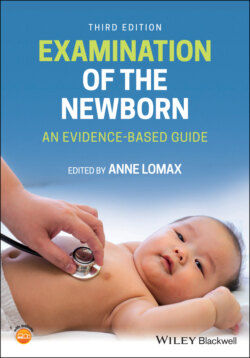Читать книгу Examination of the Newborn - Группа авторов - Страница 43
Addressing safeguarding issues when reviewing the antenatal history
ОглавлениеPublic policy, with reference to safeguarding, has rapidly changed the landscape of history taking. Having been brought into sharp focus on a national scale over the last 30 years since the advent of the Cleveland Report (1988) and the Children's Act of 1989, this issue is high on the agenda within maternity and paediatric services (DfE 2018). Evaluation of the family psychosocial background is an important facet of the newborn examination as in childhood. It is the responsibility of the NIPE practitioner to raise any concerns that have not already been addressed with the safeguarding named midwife. Once this process is activated, the safety of that newborn will become paramount.
Paternal information is often viewed as a lesser priority. However, the father's date of birth is an important demographic in tracing any previous safeguarding issues or domestic violence should concerns be raised. With the date of birth, the police protection services can investigate any previous convictions or concerns. With the movement of some population groups around the country and the fluidity of family units within society, male partners may move from one family unit to another and not disclose any information about previous relationships, e.g. SIDS, congenital anomalies or previous child deaths. It is also important to know the names and dates of birth of other siblings even when not biologically belonging to the mother of the new infant.
It is vital that all aspects of safeguarding are considered and applied during the history‐taking process for the newborn examination. Newborns can be subject to safeguarding, and the relevant assessments in the antenatal period can minimise potential harm with the right level of intervention and support (Brandon et al 2016). All significant information must be made available and shared through the use of multiagency protocols including neonatal and paediatric community teams and other multidisciplinary organisations involved in the protection of children in accordance with national and local policy.
Cultural practices can be disclosed during the history‐taking process in relation to female genital mutilation (FGM). This practice is illegal in the United Kingdom and is a high priority for safeguarding. The practice of FGM is common in Africa, the Middle East and Asia. It is mandatory for the disclosure of FGM to be reported to the safeguarding named midwife and local safeguarding policy activated and followed. The Department of Health (DfE 2020) provides further information on FGM for health care professionals available at https://assets.publishing.service.gov.uk/government/uploads/system/uploads/attachment_data/file/573782/FGM_Mandatory_Reporting_‐_procedural_information_nov16_FINAL.pdf.
The NIPE practitioner and maternity staff must be aware of their responsibilities in the safeguarding of children and adults. Lack of communication has been cited as a common and sadly repetitive failing of the 'Safeguarding Children' systems (The Victoria Climbié Inquiry Report) (House of Commons Health Committee 2003; CEMACH 2008; Haringey Local Safeguarding Children Board 2008; CQC 2009; NPSA 2009). Further information on safeguarding children can be found at https://assets.publishing.service.gov.uk/government/uploads/system/uploads/attachment_data/file/779401/Working_Together_to_Safeguard‐Children.pdf.
